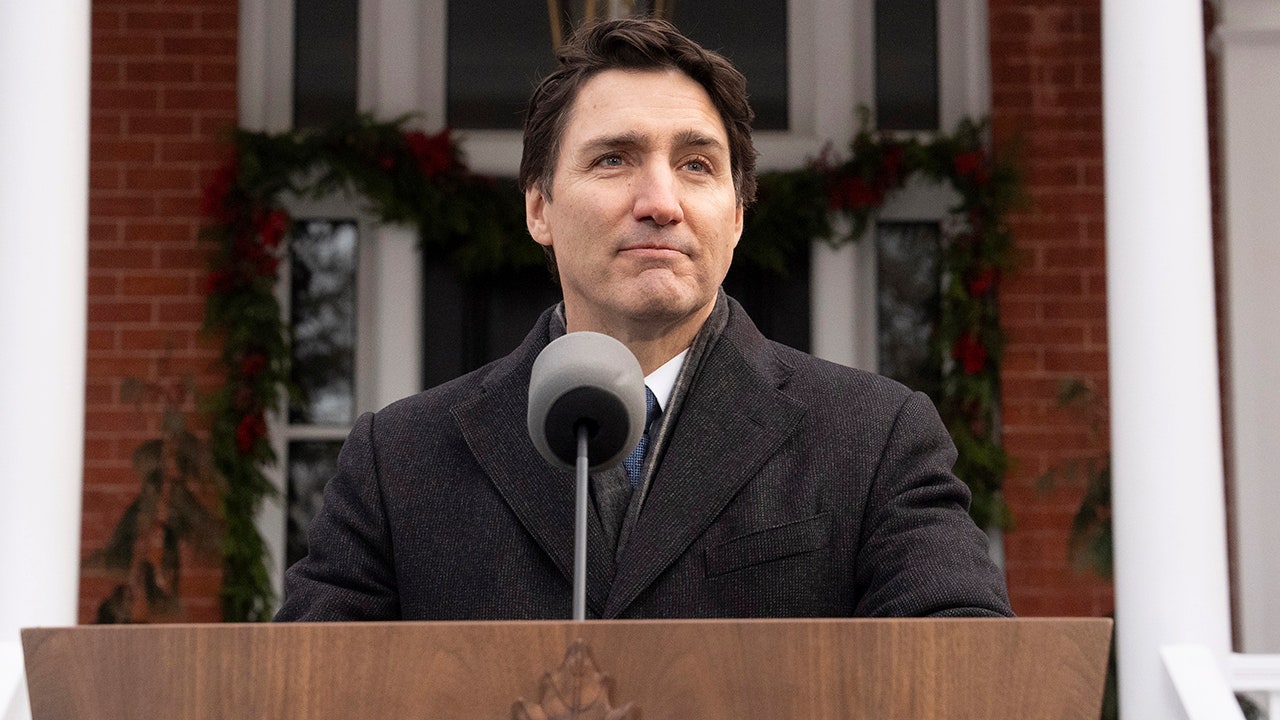Alabama
Just two doctors serve this small Alabama town. What’s next when they want to retire?
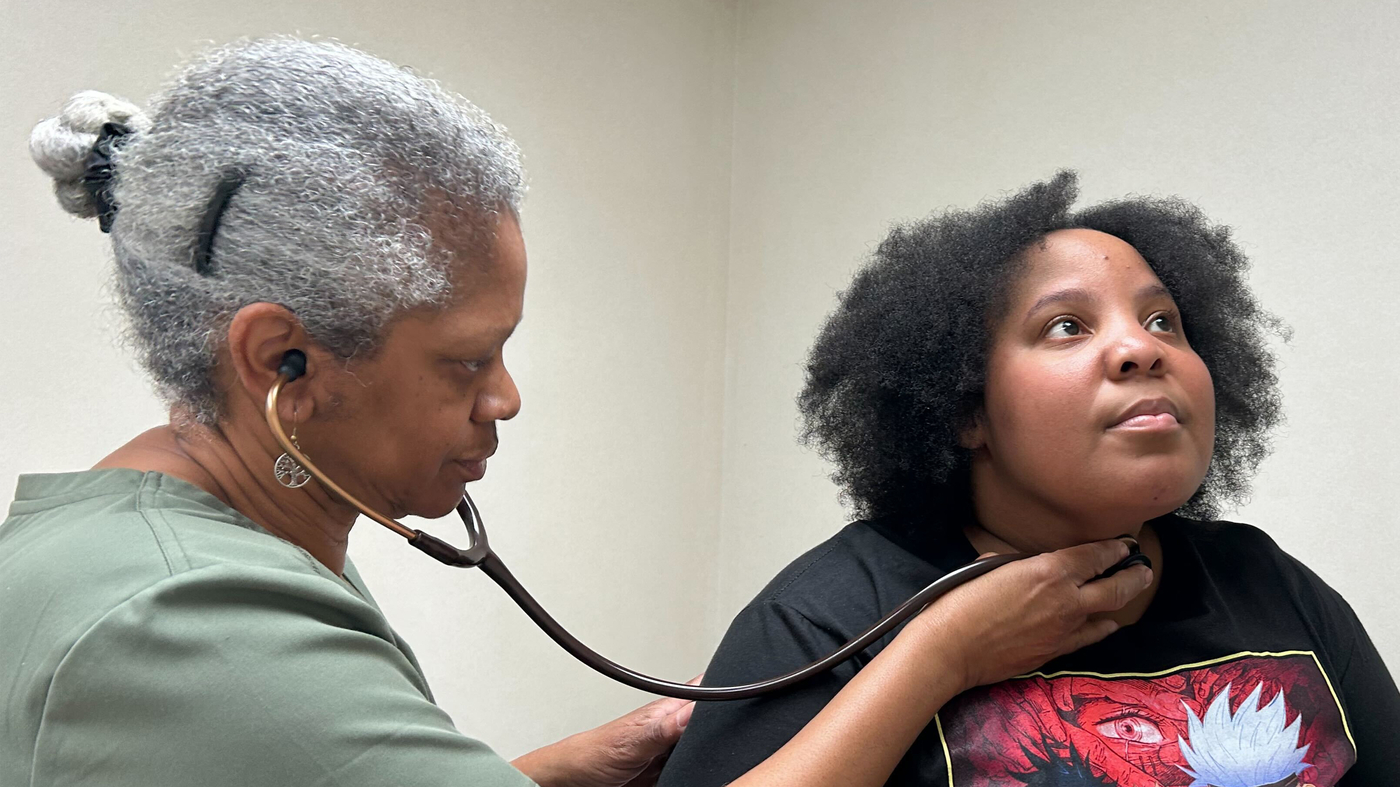
Dr. Terry Vester examines Charity Hodge at Vester’s clinic in LaFayette, Alabama. Vester and her husband are the only primary care doctors in the community.
Arielle Zionts/KFF Health News
hide caption
toggle caption
Arielle Zionts/KFF Health News

Dr. Terry Vester examines Charity Hodge at Vester’s clinic in LaFayette, Alabama. Vester and her husband are the only primary care doctors in the community.
Arielle Zionts/KFF Health News
LaFAYETTE, Ala. — Charity Hodge had mixed feelings when she spotted a Facebook post announcing that her longtime primary care doctor was ready to retire after decades of serving their rural community.
“I was like, ‘Oh my gosh, no!’” Hodge recalls while sitting in an exam room on a July afternoon, waiting to see the physician, Dr. Terry Vester. “Well, I’m happy for the retirement part, but that’s my favorite doctor, so I’m crying on the inside.”
Hodge, a 29-year-old customer service representative, has been seeing Vester for nine years. She had come to check in on her diabetes management and to ask for anti-nausea medication in preparation for a cruise.
LaFayette — pronounced “luh-FAY-it” by most residents — and surrounding Chambers County face high rates of disease and chronic illness. Yet Terry Vester and her husband, Dr. Al Vester, are the only primary care doctors in the town of 2,700 residents, surrounded by farms and other small communities.
Waiting for a replacement
The Vesters are in their late 60s and would like to retire soon. Terry Vester wants to spend more time with her grandson and aging parents. But she can’t imagine abandoning her patients, some of whom she has cared for since they were born.
“There are people here that still need in-town doctors,” says Vester, who sometimes visits patients in their homes. “So we want to stay here to take care of them until someone else is here to take care of them.”
Terry Vester’s worry — leaving her town with no doctors — is already reality across much of rural America, where many residents have health problems but few health care professionals to turn to.
LaFayette, in east-central Alabama near the border with Georgia, is a 30-minute drive to the nearest sizable city, the college town of Auburn. Its lush, wooded neighborhoods include elegant, restored homes with wraparound porches and massive lawns. But the town also has formerly grand houses that have fallen into disrepair, plus mobile homes and public housing.
The town’s median household income is much lower than the state’s and country’s. Black residents — who make up 70% of the population — are much more likely to live in poverty than white residents. They are also more likely to attend the public high school, whose student body is 90% Black and which is scheduled to close and consolidate with a majority-white school in another community.
The Vesters have worked in LaFayette since the early 1980s and saw the local hospital close in 1988. The nearest emergency room is now in another town 20 minutes away along a rolling road. So are the nearest urgent care clinic and pediatrician’s office.
Showing up where there’s help
To fill that void, residents turn to the one place in LaFayette where medical professionals are always on the clock: the city fire department, staffed with full-time firefighters and emergency medics.
Fire Chief Jim Doody worked for 13 years as the fire chief at Bagram Airfield in Afghanistan. He arrived in LaFayette in 2020, just as the county was about to be hit by one of the worst COVID-19 outbreaks in Alabama.

LaFayette’s fire chief, Jim Doody, said that without an emergency room or urgent care clinic, residents regularly bring their health problems to the fire station.
Arielle Zionts/KFF Health News
hide caption
toggle caption
Arielle Zionts/KFF Health News
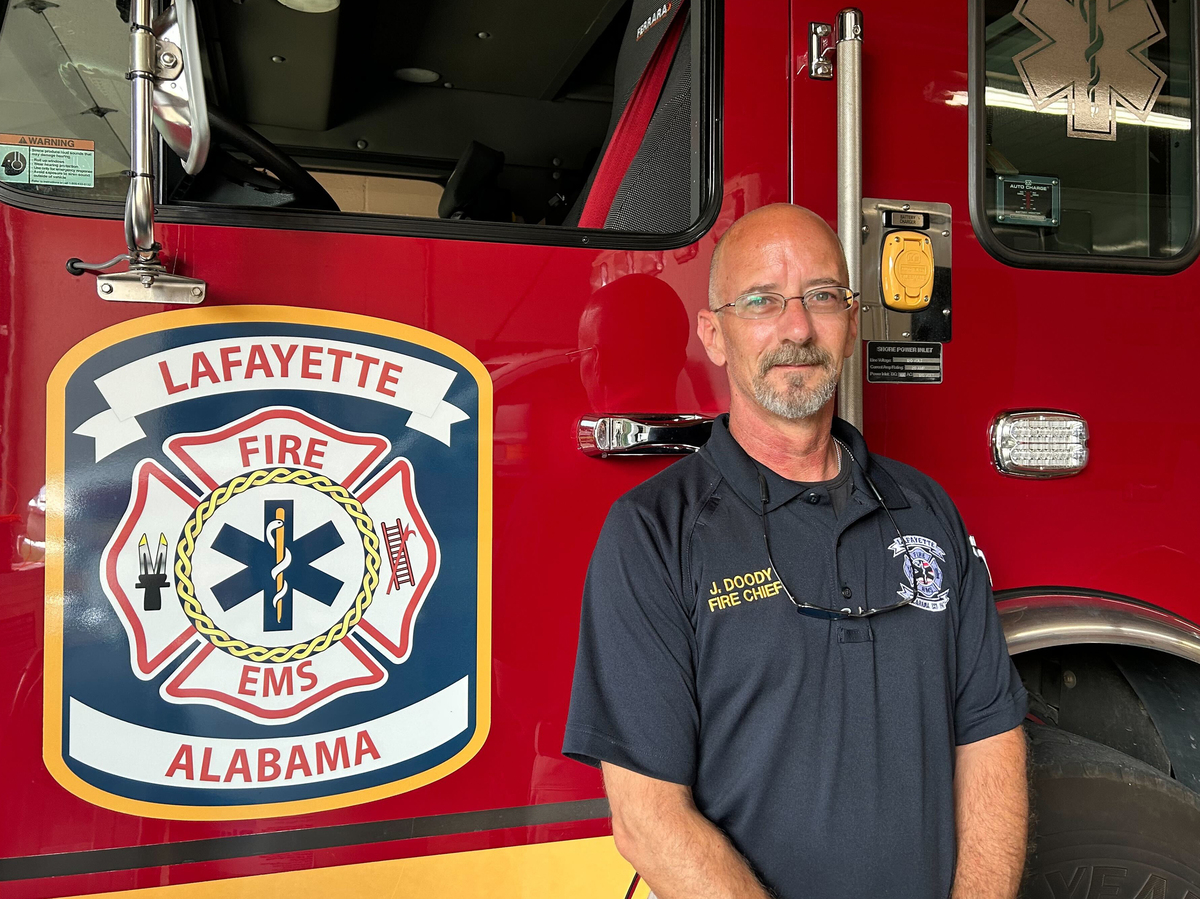
LaFayette’s fire chief, Jim Doody, said that without an emergency room or urgent care clinic, residents regularly bring their health problems to the fire station.
Arielle Zionts/KFF Health News
Doody says most of the station’s ambulance runs are for nonemergency situations. Other calls involve urgent issues that could have been headed off if patients had better access to preventive care.
People from LaFayette regularly walk or drive themselves to the fire station to ask for help, Doody says. The station has a makeshift exam area within its small entryway, containing a bench, defibrillator machine, and cabinet filled with medical supplies.
Firefighter Tanner Hill says people often arrive with concerns about fatigue, blood sugar levels, breathing difficulties, or heart trouble. He recalls helping a man who walked into the station after getting hit by a car.
“He was just like, ‘Hey, I just got run over.’ And I was like, ‘Oh, OK, well, let me check you out.’ And sure enough, he got run over,” Hill says.
Hill determined the man’s leg was broken and sent him by ambulance to the nearest hospital.
This de facto walk-in clinic option isn’t available in most other rural areas, where emergency medical services are often run by volunteers who aren’t posted at a station all day, Doody says. But he’s noticed fewer LaFayette residents relying on the fire department since a new telehealth service arrived in town.
A high-tech offering
Rickey Whitlow was recently driving in LaFayette when he saw a sign touting the new option.
The 61-year-old was intrigued. He parked his car and walked into a new health center that also houses an OnMed Care Station, a large booth stocked with a video screen and high-tech health monitoring equipment.
Whitlow was scheduled for his monthly diabetes checkup with Dr. Al Vester in a few weeks. But his feet felt like they were burning, and he needed relief now.
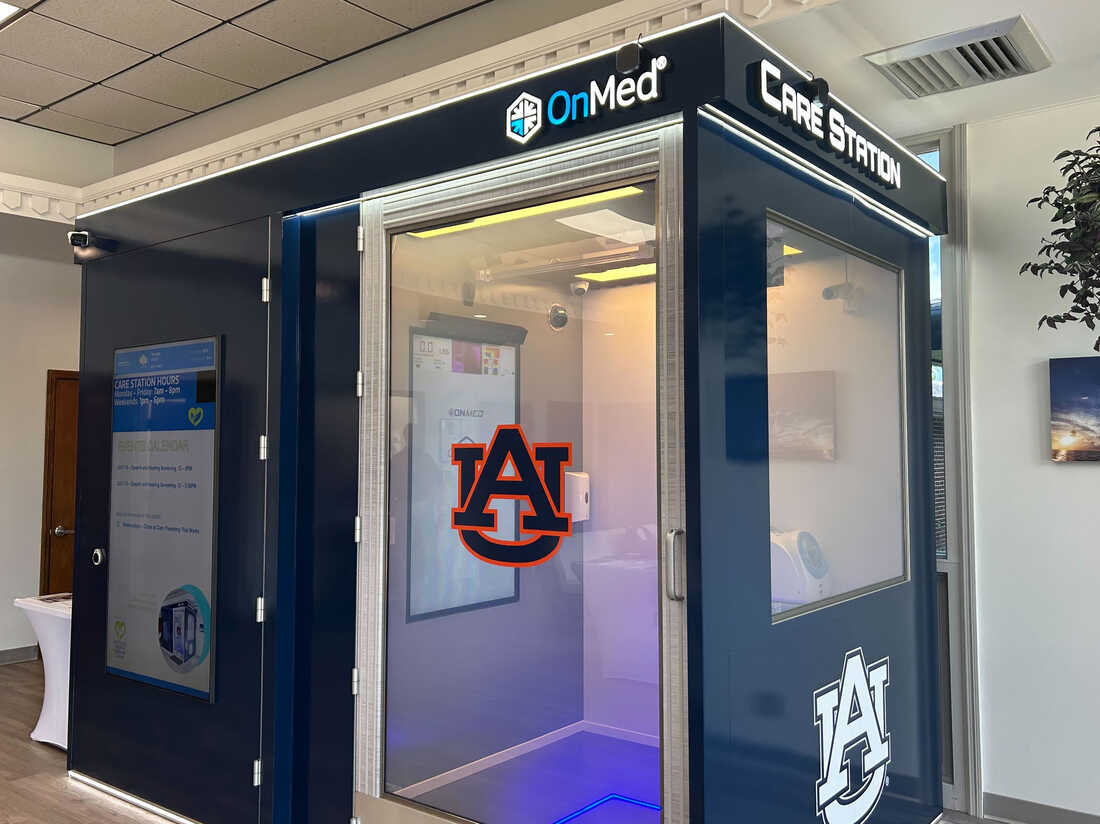
OnMed, a private company, is opening high-tech telehealth booths in rural towns across the country. This one is in new health center run by Auburn University.
Arielle Zionts/KFF Health News
hide caption
toggle caption
Arielle Zionts/KFF Health News
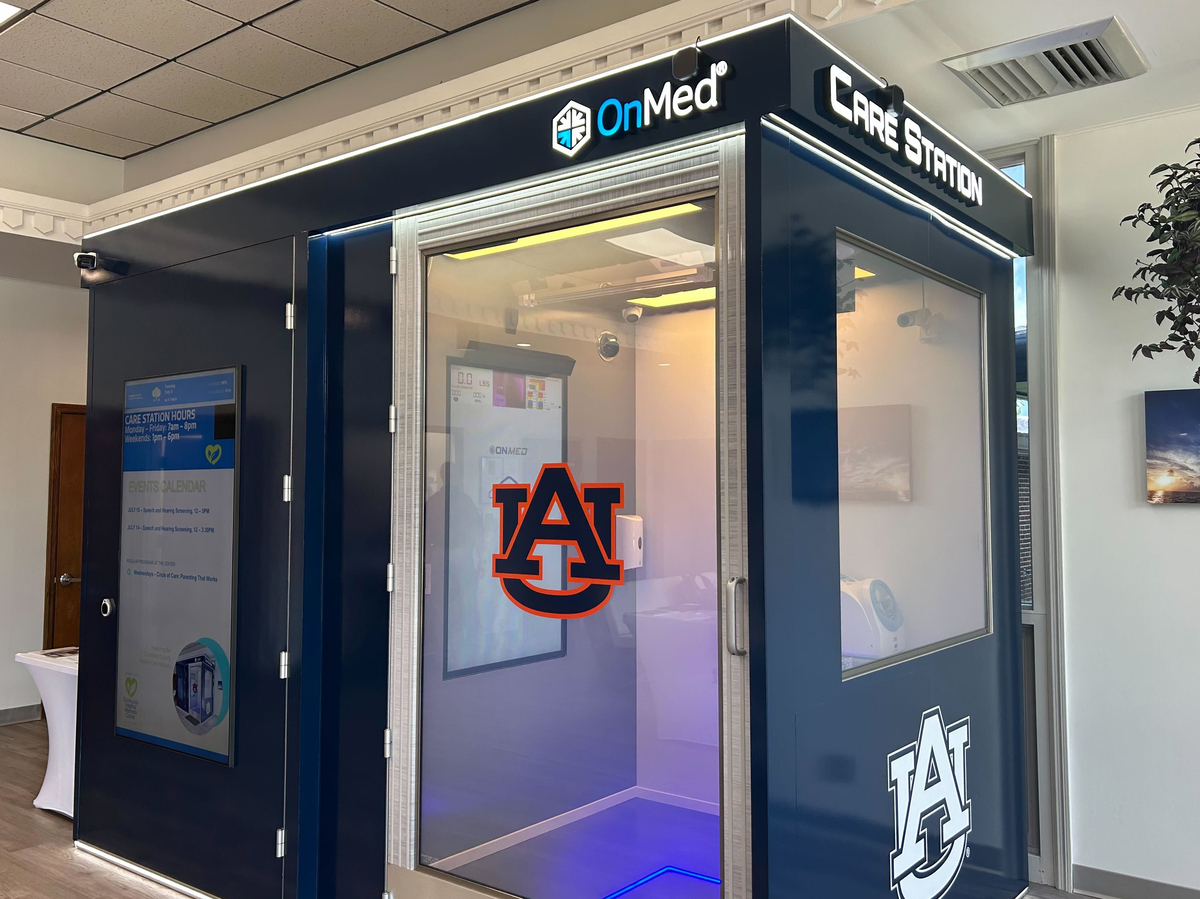
OnMed, a private company, is opening high-tech telehealth booths in rural towns across the country. This one is in new health center run by Auburn University.
Arielle Zionts/KFF Health News
Whitlow stepped into the telehealth kiosk, pressed a button, and saw a nurse practitioner appear on a large vertical video screen positioned at eye level. After consulting with the provider, he left the free appointment with a prescription for a cream to relieve his foot pain.
OnMed patients use an automated blood pressure cuff and other devices to collect their vital signs. The data is then sent to the provider treating them from a distance. Patients can also hold a stethoscope to their chest to transmit the sounds of their heart and lungs. A special camera captures internal temperatures, which can be used to diagnose infections. A hand-held camera lets providers examine problems such as rashes, irritated eyes, and swollen throats. In some states, the stations can dispense medications.
OnMed, a Florida-based company, has another kiosk in rural Texas and hopes to open several dozen more in various states next year. The company wants to keep its services free for patients, with funding from universities, health systems, nonprofits, and insurance companies.
The kiosks can stay open on evenings and weekends and are much cheaper to operate than brick-and-mortar doctor’s offices, said CEO Tom Vanderheyden. They also make telehealth available to rural residents whose home internet connections are too weak for video appointments.
LaFayette’s OnMed kiosk is part of a new health center inside a building that has seen several medical facilities come and go.
Partnering with the nearest university
The Chambers County Community Health and Wellness Center is operated by Auburn University, whose students and faculty travel there to host vaccination and diagnostic clinics, such as speech and hearing exams. They also offer health education events on topics such as healthy eating and maternal health.
The university plans to bring similar centers and OnMed kiosks to other rural Alabama towns.
Vester, the longtime primary care physician, is excited about the new health care resources in LaFayette. But she said it’s still important to have doctors in town.
“You know everyone, or you have a connection with someone,” Vester said.
Taking care of four generations
Vester’s statement rang true during recent appointments as she asked about her patients’ lives and relatives.
“Deep breath,” Vester instructed as she placed a stethoscope on Hodge’s chest. “Are you still at home with your mother? Is she doing good?”
“Yes, she’s doing very well,” Hodge said.
Earlier that day, Vester treated a patient who had throat pain and difficultly speaking after surviving a choking incident. During the appointment, the patient mentioned an upcoming funeral.
Vester knew about the funeral. It was for a woman she once treated.
“I see her daughters and then their children, and they have children — so that’s four generations right there,” Vester said. “And so, you sort of know the whole story, you know the context.”
Vester plans to reach out to Alabama medical schools to let them know she’s looking for doctors to take over for her and her husband. But she said not everyone wants to live in rural areas like LaFayette.
The doctor hopes some of the Auburn students will want to serve in LaFayette after seeing what it’s like working at the new health center. She said it’s nice to live in a small, quiet town that’s relatively close to larger cities, and to run an independent clinic rather than work for a larger health system.
Vester said the charm of LaFayette and its residents is also a selling point.
“All they have to do is pretty much come here and spend a day and go through what we do, and I think they would enjoy it,” she said.
KFF Health News, formerly known as Kaiser Health News (KHN), is a national newsroom that produces in-depth journalism about health issues and is one of the core operating programs at KFF — the independent source for health policy research, polling, and journalism.

Alabama
Letter: Mr. Lyman’s wish list for Alabama’s Legislature

Kudos to Mr. Lyman. It takes chutzpah to ask our legislators to consider his 2025 wish list after having called them soul-less barbarians for years. Yet, legislators would agree wholeheartedly with his final wish, under his “DEI” label: for our teachers “to share the true history of the state, without any vague and mealy language intended to scare people from basic principles of truth and respect.”
Amen to that. Mr. Lyman being a woke advocate, let’s take a snapshot of that history as it relates to Blacks, the largest class of victims in woke theology. The 1960s and before was the era of invidious discrimination. Blacks were like the Israelites in Egypt. Merit didn’t count. Black welders, for example, with decades of talent and families to feed, some fresh from two wars welding tanks and airplanes, had to watch less qualified white apprentices walking through factory gates throughout America, taking the jobs the Blacks desperately needed and could perform better.
Then came Dr. Martin Luther King. Their Moses, who led them from bondage. Followed by brave white Alabamians like our legislators in the 1960s who (in several cases had to ignore death threats) changed Birmingham’s form of government to remove its racist Police Commissioner Bull Connor. Since then, white-majority governments have passed all sorts of laws, spent trillions of dollars, and seen millions of white people help blacks all over, even here in Alabama. Merit started counting and Blacks began flourishing in this Promised Land of ours–climbing ladders everywhere, heading Top Ten lists, from actors and athletes to scholars and entrepreneurs. There’s been magic in that rise of Blacks, and in all fairness, those of us Baby Boomers who’ve served in the trenches to end employment discrimination and know what a Bull Connor Billy Club can do to a man’s skull and emotions, can feel that magic far better than younger generations like Mr. Lyman’s.
But, then came wokeism, which has become the established faith in the legal and regulatory framework of the American political system, elite corporate culture and academia. Central to its creed is CRT, which tells precious black children they’ll be fighting an uphill battle against a society controlled by white people who hate them. CRT pollinated DEI, which tells those children that merit doesn’t count: without DEI’s brand of preferential treatment, they’ll be denied opportunities. As a result, children become poisoned with hate and fear. Thinking, don’t fight the system. Forget studying hard to follow your dreams. Many opt for rebellion and crime.
So yes, we need true history. To demonstrate that while our society has certainly not reached the ideal of being color-blind, we are light years better than yesteryear. We’d have never elected a black president and vice president if we were white supremacists. Our children need the confidence that came over with the Mayflower that, with hard work and ambition, the American dream is theirs. So long as they don’t drink the poisoned Kool-aide of CRT and DEI.
Guy V. Martin Jr., Montgomery
Alabama
WATCH: ALABAMA SHAKE's Brittany Howard perform w/ Kumite, her hardcore band, live for the first time

Back in November, we covered the announcement of Kumite, the hardcore side project led by Grammy-winning Alabama Shakes frontwoman Brittany Howard. Tonight, Kumite made their live debut at Basement East in Nashville, TN. Sharing the bill were Snooper, Inner Peace, and Second Spirit.
Check out the following footage captured by @bmenchthurlow
As part of the set, Kumite also covered “AM/PM” by American Nightmare, which you can watch below.
Alabama
Alabama A&M University names construction adviser for new science, student amenities buildings

-

 Politics1 week ago
Politics1 week agoWho Are the Recipients of the Presidential Medal of Freedom?
-

 Health1 week ago
Health1 week agoOzempic ‘microdosing’ is the new weight-loss trend: Should you try it?
-
/cdn.vox-cdn.com/uploads/chorus_asset/file/25822586/STK169_ZUCKERBERG_MAGA_STKS491_CVIRGINIA_A.jpg)
/cdn.vox-cdn.com/uploads/chorus_asset/file/25822586/STK169_ZUCKERBERG_MAGA_STKS491_CVIRGINIA_A.jpg) Technology4 days ago
Technology4 days agoMeta is highlighting a splintering global approach to online speech
-

 News1 week ago
News1 week agoSeeking to heal the country, Jimmy Carter pardoned men who evaded the Vietnam War draft
-

 Science2 days ago
Science2 days agoMetro will offer free rides in L.A. through Sunday due to fires
-

 News1 week ago
News1 week agoTrump Has Reeled in More Than $200 Million Since Election Day
-

 Movie Reviews6 days ago
Movie Reviews6 days ago‘How to Make Millions Before Grandma Dies’ Review: Thai Oscar Entry Is a Disarmingly Sentimental Tear-Jerker
-
/cdn.vox-cdn.com/uploads/chorus_asset/file/25821992/videoframe_720397.png)
/cdn.vox-cdn.com/uploads/chorus_asset/file/25821992/videoframe_720397.png) Technology6 days ago
Technology6 days agoLas Vegas police release ChatGPT logs from the suspect in the Cybertruck explosion











